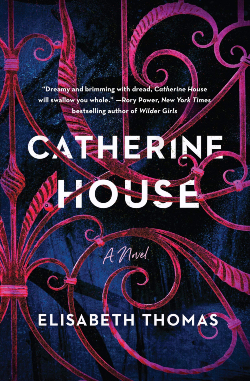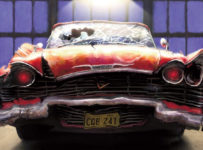
If you knew how Catherine House ended, you would never start it. The book is enough of a hodgepodge of blind alleys, ciphers of characters, and that deadly mix of hedonism and anhedonia granted only to the particularly privileged already, and then you hit the final sentence. You are in the house and the house is in the woods. But the book is thrown across the room.
With its conclusion, Catherine House transforms from an unenjoyable novel to a loathsome exercise. This ending was better in 1985, but so was the whole book leading up to that functionally identical conclusion. Readers do not forget.
Teenage runaway Ines Murillo de los finds herself at the prestigious college known as Catherine House, an all-expenses paid institution that has a reputation for high-profile graduates, but also the air of a cult. Catherine House follows Ines across three years of her education as she attempts to figure out why she never wants to leave her shabbily appointed luxury.
The best thing about Catherine House is that it's set in the back end of the nineties, so none of the characters have read Harry Potter and no one is desperate to compare their entire college experience to Hogwarts at every opportunity. The worst is everything else.
Ines is the first problem: Elisabeth Thomas has written the narrative from the perspective of a character who doesn't just have the usual problem of low self-esteem dogging her words: she literally does not care what happens to either herself or any of the people around her. Ines is a character who feels nothing; with no reaction to the novel's scant drama from this protagonist, it is difficult for a reader to care on her behalf. The frustration with Ines' passive nature is the novel's true through-line, and even when we learn the nature of her entirely predictable "dark past†she still has neither texture nor flavour.
It is impossible to say who Catherine House would appeal to, as there is nothing seductive to the reader about the institution — Thomas often goes out of the way to mention how dilapidated and ill-kempt it is, with frequent disgusting descriptions of the rich but tasteless food served there — and nor is there a pall of dread and horror over proceedings. The house has a confusing layout, but this is less Lovecraftian than poor architecture. Ines is a poor student, but this might be more because her curriculum is a mixture of literally made up disciplines and the sort of fare that reads as a parody of the out of touch nature of academia than her actual intellectual ability.
Catherine House operates on an insultingly high level of assumed knowledge for a theorem that doesn't exist; for a story that hinges on a substance called "plasmâ€, you will exit the novel with only a slightly less vague understanding of a concept you had previously never heard of. Thomas doesn't believe in exposition, but equally has no interest in contextual clues: a deadly combination. Thomas can't build an air of intrigue around the smothering environment she has constructed, and her characters aren't even smart enough to drink the copious amount of wine that the House provides out of glasses: there are so many abused tea cups on these pages it's distressing.
Any good will … and there is precious little … is undone by the practically plagiarised ending. The staff of batrock.net (i.e. the writer of this piece) does not wish to be sued, but Catherine House has a final sequence that feels lifted from a classic 1985 dystopia that has had a resurgence and a sequel in recent years, with none of the nuance or finesse entered into there. The specific title will not be mentioned here; it's a Tale for another time.
This ending — and it is one that does pop up from time to time in pretenders to the crown — is not an automatic disqualifier of everything that came before it. But in a book as borderline as Catherine House, it's enough to send it plummeting to the bottom of the rankings. Regardless of whether the publishers, editors, and everyone else involved in the delivery of Catherine House to your store, door, or e-reader — in the middle of a global pandemic, no less — thought that they had a winning product here, there is no way that this iconic 35 year old ending should have been reproduced in 2020.
Catherine House is a cipher novel, populated by cardboard cutouts of characters, a truly nonsensical curriculum, and an impenetrable confidence that it all makes sense. There is no intrigue to grab onto here, no silver lining to the copious clouds that Thomas feeds the reader. It's a strangely easy read, but because there's nothing to engage with between these pages, you're shot straight through Catherine House's digestive tract, plopped out the other end dirty and disgruntled.


